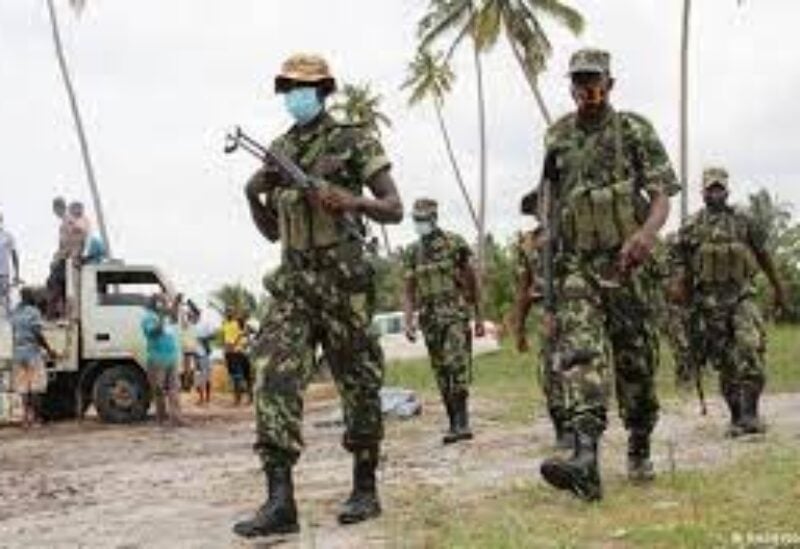
Mozambique army
Mozambique local religious leaders are organizing an ideological offensive with the goal of opening new paths toward peace, while joint Mozambican, Rwandan and Southern African Development Community troops battle Islamist insurgents in the northernmost Mozambican province of Cabo Delgado.
Since 2017, an armed group whose goals remain unclear has been attacking several districts in Cabo Delgado.
Its violent acts include killing civilians — many times involving decapitation — destroying entire villages and kidnappings.
Strategic locations, including the city of Mocimboa da Praia, had been under the group’s control for several months.
Between 2018 and 2019, the insurgents — known locally as Al-Shabab but not related to the Somali group of the same name — began pledging allegiance to Daesh.
Their actions have caused the displacement of an estimated 850,000 people to the province’s capital Pemba and to other southern districts. Large natural gas exploitation near the town of Palma has had to be suspended.
The crisis has led many international organizations to deploy people and resources to offer relief to those impacted.
At the end of 2021, Muslim and Christian leaders gathered in Pemba to discuss how religion could bring peace back to Cabo Delgado.
The insurgents “don’t have anything to do with Islam. They claim to be Muslim and have Muslim names, but everything they do is contrary to Islam,” said Sheikh Aminuddin Muhammad, who leads Mozambique’s Islamic Council.
He emphasized that the insurgents have attacked several imams and burned mosques since they began to operate in Cabo Delgado.
“Back in 2017, we began to notice a strange movement of foreigners and the dissemination of awkward propaganda in Cabo Delgado. We were the first institution to alert the government to that group,” he told Arab News.
The authorities took a while to deport a number of the group’s initial leaders to neighboring Tanzania, but the “evil seeds had already been planted and the movement continued to grow,” said Muhammad.
Several factors converged to help Al-Shabab recruit young Cabo Delgado men, including a historical ethnic divide between the coastal Mwani people and the Makonde, who live mainly in the countryside.
“The Mwani are mostly Muslim while the Makonde tend to be Catholic. Although there’s a traditional religious tolerance in the region, the insurgency leaders take advantage of those divides,” said Father Eduardo Oliver, who is in charge of interfaith work at the Roman Catholic Diocese of Pemba.
The province welcomed the first Arab traders in the eighth century. After a first wave of enslavement, the Mwani were Islamized.
In the 16th century, Portuguese colonizers began to arrive, introducing new tensions between the different local ethnicities.
The Makonde mostly converted to Catholicism, while the Mwani mostly kept their Islamic faith.
Since Mozambican independence in 1974, the cleavage incentivized in colonial times has been reactivated. Many of the insurgency’s recruits are young Mwani men.
“But what really stimulates the insurgency is poverty. They manage to attract youngsters by offering them money or a source of income,” Muhammad said, adding that poor levels of education in the region make the situation more complex.
Sheikhs from different communities and associations attended the meeting with the Christians in December.
One of the starting points for the event was the 2019 Document on Human Fraternity for World Peace and Living Together, signed by Pope Francis and Sheikh Ahmed El-Tayeb, grand imam of Al-Azhar, said Oliver.
“There’s a clear manipulation of religion by the insurgents, so we wanted to show society that religion is really a solution to the conflict, not its cause,” he added.
The religious leaders worked together on a joint statement released in January. In the document, they emphasize that it is unacceptable to connect terrorism with Islam, and that they repudiate any act of violence perpetrated in the name of religion.
They also committed to education as a means to prevent young men from adhering to extremist ideas, and to the rehabilitation of former members of the insurgency.
“We hope that the military forces will be victorious, but it isn’t only about war. Educational and social efforts are also needed,” Muhammad said.
“We need to offer better opportunities to the youth, we need to educate them, and we need to improve their living conditions.”
A pedagogical effort also needs to be directed to Mozambican society as a whole, given that part of the country’s media ended up reinforcing anti-Muslim sentiments in connection to the insurgency.
“Islam has a thousand-year history in Mozambique, and everybody knows that it has always peacefully shared the same space with other religious groups,” said Muhammad.
“But now there’s unfortunately a bit of intolerance in Cabo Delgado. Many women have to avoid wearing a hijab, for instance.”
Muslim entities have also been working non-stop to help the displaced. Local Sheikh Nassurulahe Dula, who leads Mozambique’s Islamic Congress, told Arab News that many Muslim families have welcomed refugees in their homes.
“At the same time, mosques have been collecting and distributing food and medicine donations since the beginning of the war,” he said.
“We help all displaced, no matter if the people are Muslim or Catholic. We don’t ask them about that, we just help them.”